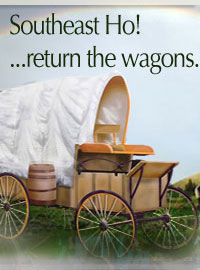
|
As Americans become more mobile and the economic policies of the states become more polarized, we are becoming a nation engaged in an extraordinarily civil war – one in which the most productive Americans are increasingly choosing a self-imposed quarantine from their statist siblings.
|
|
| If the past few years have taught us anything, it’s that the inconvenient truths of the free market have a way of puncturing political pretension. Take, for example, these data from a 2009 report by the American Legislative Exchange Council (ALEC):
"When comparing California with Texas, U-Haul says it all. To rent a 26-foot truck oneway from San Francisco to Austin, the charge is $3,236, and yet the one-way charge for that same truck from Austin to San Francisco is just $399. Clearly what is happening is that far more people want to move from San Francisco to Austin than vice versa, so U-Haul has to pay its own employees to drive the empty trucks back from Texas."
Much to the chagrin of California’s governing class, the San Francisco-Austin example is a specific representation of a general trend. With the Golden State beset by hemorrhaging budget deficits, a crushing regulatory burden and some of the nation’s highest taxes, a group of more than 650 CEOs recently ranked California the nation’s worst place to do business. Texas was ranked the best. According to American Enterprise Institute’s Mark J. Perry, comments by sampled chief executives included:
-- “Texas is pro-business with reasonable regulations, while California is anti-business with anti-business regulations.”
-- “California is terrible. It’s the most difficult state in the nation.”
-- “The leadership of California has done everything in its power to kill manufacturing jobs in this state.”
-- “You feel like the Texas state government understands the value of business and industry to create jobs and growth.”
On first blush, the obvious consequence of this sharp disparity between the nation’s two most populous states is economic. Higher barriers to prosperity mean fewer jobs and less tax revenue for state governments. For incurious legislators, this may well be where the analysis ends. But as the ALEC report underscores, there’s a deeper problem: Americans are increasingly voting with their feet. Thus, the result of anti-business policies isn’t just less money. It’s less money and fewer people.
In light of their sharply contrasting economic climates, it should come as no surprise that California and Texas are likely to head in different directions when the congressional reapportionment from the 2010 census is implemented. For the first time in its history of more than 150 years, previously invincible California may lose a seat in the House of Representatives. By contrast, Texas is widely expected to gain four.
While California and Texas are examples at the extremes, the same trend is playing out throughout the nation. Reapportionment is expected to add seats in the more market-friendly states of the West and the South, such as Nevada, Utah, Arizona, South Carolina, Georgia and Florida. At the same time, the sclerotic economies of the Upper Midwest and the Northeast – dominated by government intervention and large union presences – will cause congressional losses in a nearly unbroken string running from Minnesota to New York (only Wisconsin and Indiana are expected to escape the knife).
Welcome to the new federalism. As Americans become more mobile and the economic policies of the states become more polarized, we are becoming a nation engaged in an extraordinarily civil war – one in which the most productive Americans are increasingly choosing a self-imposed quarantine from their statist siblings.
For now, this arrangement is preserving a fragile peace. But every day we get closer to the hour when the high taxes, reckless pensions and lavish entitlements of the government-driven states will lead them to rattle their tin cups at the doors of those who have embraced the free market.
They shouldn’t hold their breath. |


